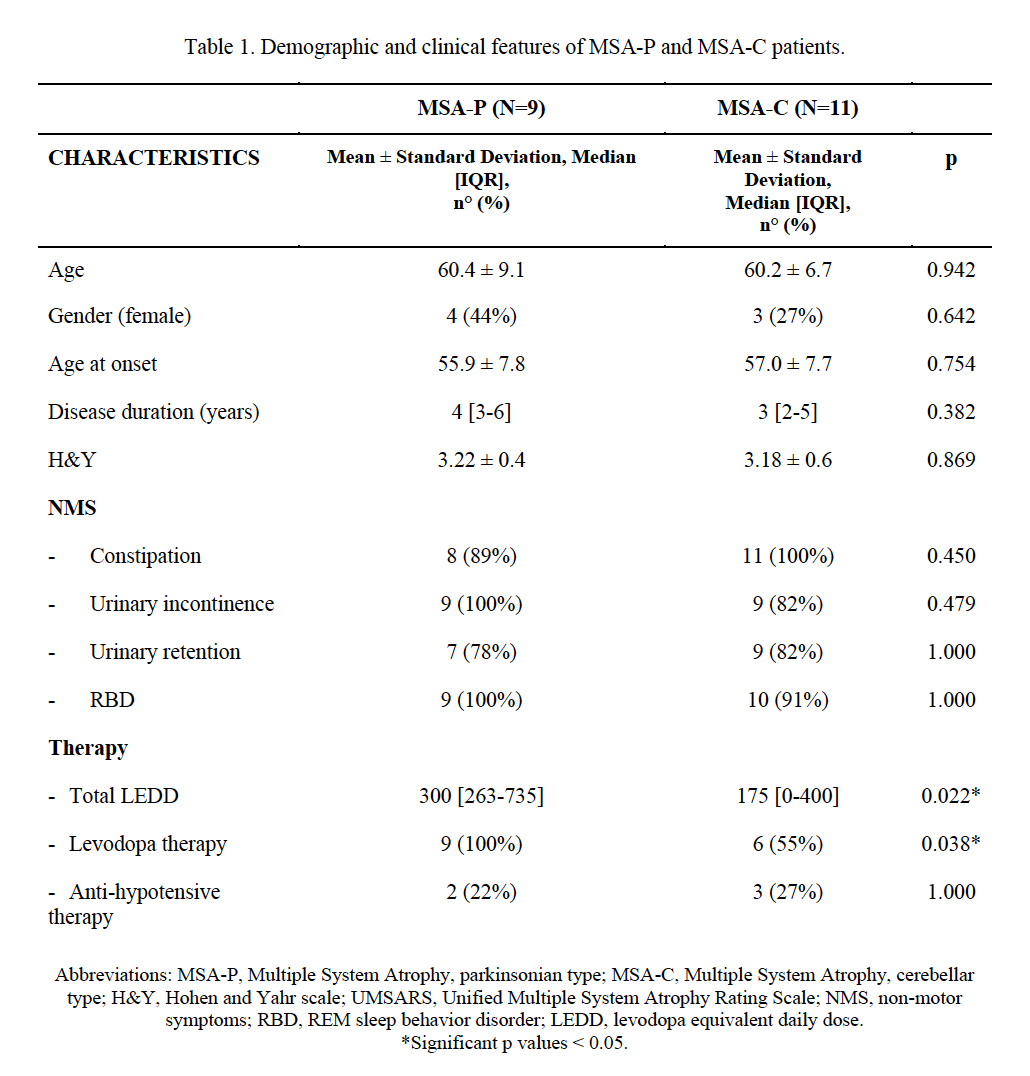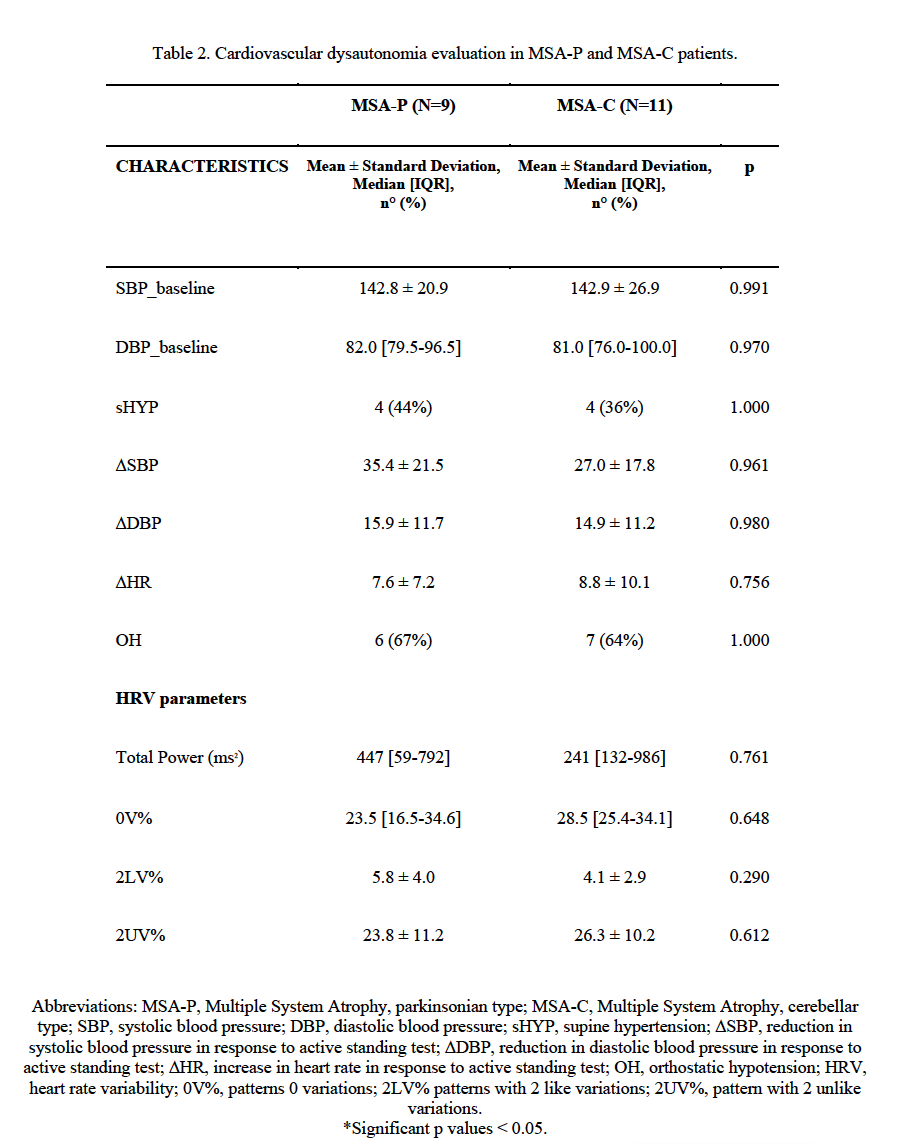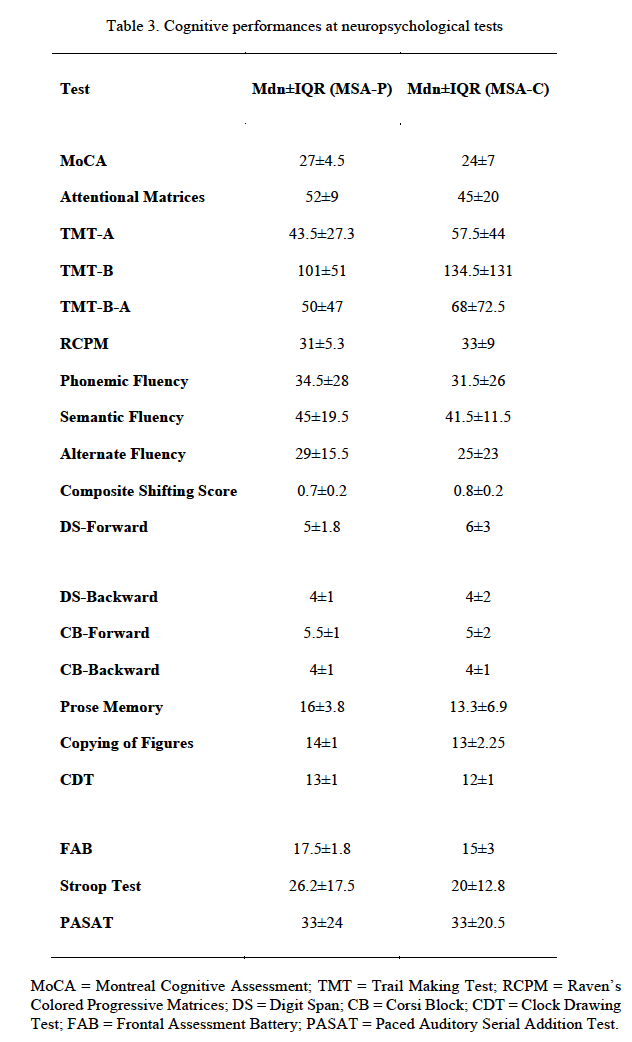Category: Parkinsonism, Atypical: MSA
Objective: This study aims to assess the cardiovascular autonomic profile in patients suffering from either MSA-P or MSA-C, and subsequently to explore a potential link between dysautonomia and cognitive performances, evaluated with a thorough neuropsychological battery.
Background: MSA is a rare pleiotropic lethal neurodegenerative disease, whose clinical hallmark is the combination of progressive autonomic dysfunction and extrapyramidal and cerebellar signs. Dementia is considered a non-supporting feature in the current diagnostic criteria for MSA. Nevertheless, the evidence of cognitive impairment among MSA patients has been growing (1)(2). The link between cardiovascular dysautonomia and cognitive involvement also remains to be clarified, together with the possible differences between the two motor phenotypes.
Method: All patients underwent a complete neurologic and neuropsychological evaluation, assessing global cognitive functioning, attention, executive functions, deductive reasoning, verbal fluency, memory, and praxis. Autonomic function was assessed by means of beat-to-beat blood pressure measurement and ECG registration, with subsequent heart rate variability (HRV), at rest and upon active standing.
Results: 20 patients were recruited, 9 suffering from MSA-P and 11 from MSA-C. The two cohorts did not differ significantly in terms of age, disease duration, disease severity, and autonomic dysfunction (OH, SH, HRV).
MSA patients had normal MoCA scores, only with a borderline score. TMT was abnormal in 25 % (part A) and 20% (part B) of patients; Verbal Fluency in 10 %, Digit span in 25 % forward and 10 % backward, Corsi block in 15% forward and 10% backward, Prose Memory in 25 % of patients, Clock Drawing Test in 5 %, FAB in 10%, and PASAT in 15% of patients.
When comparing MSA-C and MSA-P patients, we found significant differences in the performances at Attentional Matrices (p=.045), TMT part B (p=.045) and B-A (p=.035), Clock Drawing Test (p=.029) and FAB (p=.034). Notably, MSA-C patients obtained lower scores in all the above-mentioned tests.
No significant correlations were found between neuropsychological tests and autonomic functions.
Conclusion: As previously reported, in a context of good cognitive functioning, patients with MSA-C performed inferiorly in attentive-executive tests compared to MSA-P patients (1). However, this does not appear to be related to a different impact of autonomic dysfunction.
References: (1) Stankovic I, Krismer F, Jesic A, Antonini A, Benke T, Brown RG, et al. Cognitive impairment in multiple system atrophy. Mov Disord. 2014 Jun;29(7):857–67.
(2) Eschlböck S, Delazer M, Krismer F, Bodner T, Fanciulli A, Heim B, et al. Cognition in multiple system atrophy: a single-center cohort study. Ann Clin Transl Neurol. 2020 Feb;7(2):219–28.
(3) Chang CC, Chang YY, Chang WN, Lee YC, Wang YL, Lui CC, Huang CW, Liu WL. Cognitive deficits in multiple system atrophy correlate with frontal atrophy and disease duration. Eur J Neurol. 2009 Oct;16(10):1144-50. doi: 10.1111/j.1468-1331.2009.02661.x.
To cite this abstract in AMA style:
G. Lazzeri, A. Carandina, T. Di Fonzo, F. Arienti, E. Monfrini, I. Trezzi, G. Franco, E. Tobaldini, A. Di Fonzo. Cognitive performances and autonomic dysfunction in MSA patients [abstract]. Mov Disord. 2022; 37 (suppl 2). https://www.mdsabstracts.org/abstract/cognitive-performances-and-autonomic-dysfunction-in-msa-patients/. Accessed December 24, 2025.« Back to 2022 International Congress
MDS Abstracts - https://www.mdsabstracts.org/abstract/cognitive-performances-and-autonomic-dysfunction-in-msa-patients/



